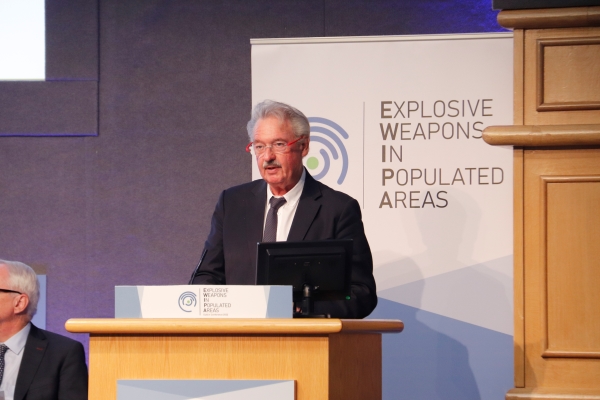 Jean Asselborn, Minister of Foreign and European Affairs;
Credit: MAEE
Jean Asselborn, Minister of Foreign and European Affairs;
Credit: MAEE
On Friday 18 November 2022, at the invitation of the Minister for Foreign Affairs and Defence of Ireland, Simon Coveney, Luxembourg's Minister for Foreign and European Affairs, Jean Asselborn, participated in the high-level conference on the protection of civilians against the humanitarian consequences arising from the Explosive Weapons Use in Populated Areas (EWIPA) held in Dublin.
In the presence of several European and international Ministers of Foreign Affairs, the High Representative of the United Nations for Disarmament Affairs, Izumi Nakamitsu, as well as representatives of civil society, the high-level conference notably made it possible to adopt the political declaration on strengthening the protection of civilians against the humanitarian consequences arising from the use of explosive weapons in populated areas.
The adoption of this political declaration is the result of several years of negotiations, in which Luxembourg was actively involved.
“We have come a long way since the launch of work on the political declaration in 2019,” Minister Asselborn stressed, adding that “the political declaration adopted today by around 80 countries marks an important step in the protection of civilians”.
In his speech, Minister Asselborn recalled that when explosive weapons are used in populated areas, 90% of the victims are civilians, which causes devastating suffering. "Explosive weapons generally create a zone of deflagration and fragmentation, which means that they can destroy civilian life and infrastructure indiscriminately and over a wide area", noted Minister Asselborn, before emphasising: "There is no this is not a phenomenon of the past. This is happening right now, in Ukraine or Yemen, and in other countries around the world. How many other cities and their populations will face the same fate as Mariupol, Aleppo, Grozny or Sana'a, to name but a few?".
“There are many countries, whose civilians suffer greatly from the use of explosive weapons in populated areas, but who are not present among us today: we call on these countries to adhere to this political declaration, so that it can make a difference in the field", said Minister Asselborn.
Minister Asselborn wanted to highlight the many devastating effects that can result from the use of explosive weapons in populated areas: "Let's not forget the medium and long-term effects, beyond the immediate suffering: thousands of children can no longer go to school because their school has been destroyed. The destruction of schools also exacerbates gender inequalities and exposes children to additional risks.”
To conclude, Minister Asselborn insisted on the importance of engaging in a follow-up process to this political declaration, also ensuring the inclusion of humanitarian partners in this follow-up work, as well as the importance of facilitating the collection of given, in particular by the UN, the International Committee of the Red Cross and Non-Government Organisations (NGOs).
Finally, Minister Asselborn said that this political declaration is “not an end in itself, but a step in the realisation of our commitments to strengthen the protection of civilians in armed conflicts, in all circumstances".
On the sidelines of the high-level conference, Minister Asselborn also had a bilateral meeting with his Irish counterpart, Simon Coveney.








